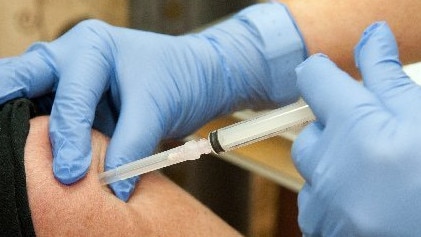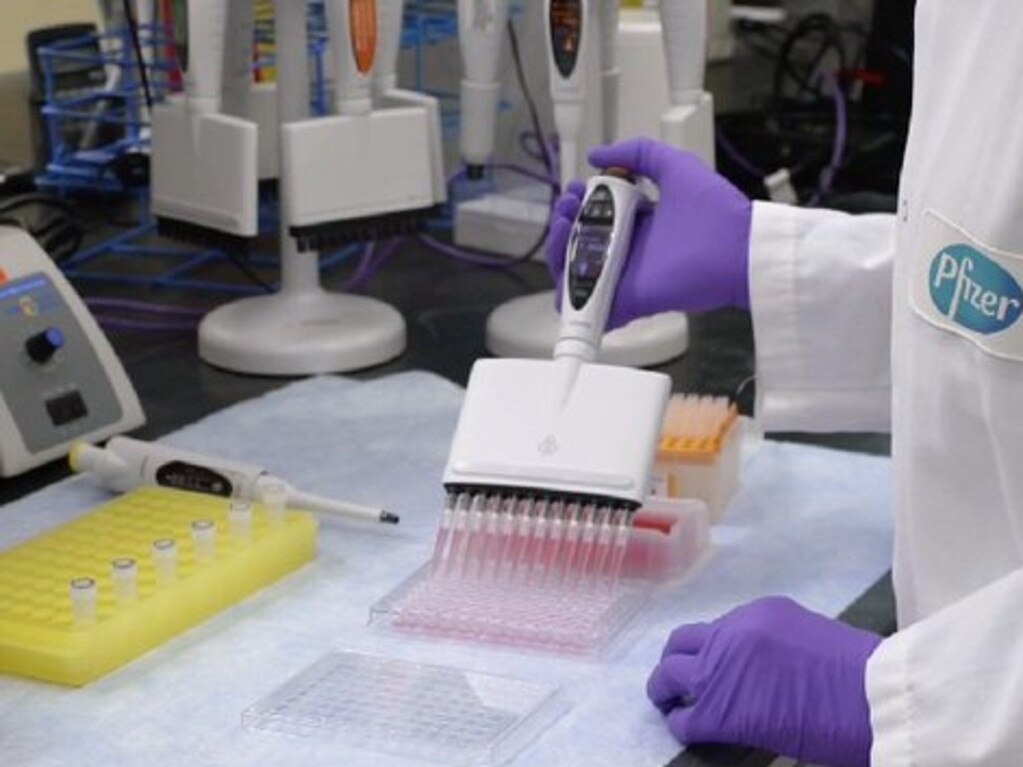Challenges ahead before world gets a shot at normality
The pending arrival of a vaccine won’t replace the need for rapid testing and one key question remains: do we have enough freezers?

The finish line is nearing in the race to deliver a COVID-19 vaccine, with Pfizer announcing it has completed phase-three trials with 90 per cent effectiveness, but challenges remain in restoring Australia and the world back to some kind of normality.
The Pfizer results sent markets worldwide into a frenzy, with the S&P/ASX 200 Index gaining as much as 2.2 per cent intraday on Tuesday, and double-digit gains for dozens of stocks.
Pfizer chairman and chief executive Albert Bourla said the completion of the company’s phase-three trials for its COVID-19 vaccine, and the fact that it was 90 per cent effective, was a “great day for science and humanity”.
The 90 per cent effectiveness exceeded not only Pfizer’s expectations but also investors. The market was expecting a vaccine to be 50-60 per cent effective, with a minimum rate of 30 per cent.
“With [Tuesday’s] news, we are a significant step closer to providing people around the world with a much-needed breakthrough to help bring an end to this global health crisis,” Dr Bourla said. But the pending arrival of the vaccine won’t replace the need for rapid testing and one key question remains: do we have enough freezers?
Pfizer’s vaccine needs to be transported at as low as -70C, which is colder than the average temperature of the South Pole in winter.
Ultracold freezers are not common across most logistics companies and in hospitals because most drugs and vaccines don’t need them. The chickenpox vaccine is one of the few vaccines that needs to be stored frozen.
Meanwhile, flu vaccines can be stored at 2C-8C, which is the temperature of a household fridge.
DHL, owned by Deutsche Post, produced a study with McKinsey & Co in September to help governments and various organisations secure a stable supply chain for vaccines and medical goods during COVID-19, and future health crises.
“With this new generation of vaccines, where nobody has stability data yet and the producers of these vaccines are trying to be on the safe side and telling us ‘you most likely need to keep these vaccines cold in the range of -80C to -20C’, this is something really new,” DHL chief commercial officer Katja Busch told The Australian when the study was released.
“You can do that with dry ice and keep a shipment stable for three to four days, then you have to re-ice it. And we can reach each and every destination in the world with those deep frozen vaccines.”
Logistical challenges aside, another big hurdle is gaining widespread community acceptance of a COVID-19 vaccine to achieve herd immunity. While governments have said a vaccine will allow the world to return to some kind of normality, lifting international travel bans and reopening borders, there has been reluctance among some to inject themselves with a vaccine that has taken less than a year to develop. It usually takes up to 15 years to develop a safe, effective vaccine.
Global fund manager MFS said financial markets were “betting big that one or more successful coronavirus vaccines will help society return to normal”.
“This is a multihorse race, hopefully with multiple winners. It goes without saying that we hope this becomes an overcrowded market with immense competition and success for all involved,” MFS analysts Nicholas Demko, Matthew Scholder and Robert Almeida said in a note to investors.
“However, following regulatory approvals, vaccine makers face mass production and distribution challenges. For example, China and India manufacture the bulk of the world’s vaccines, presenting the potential for bottlenecks.
“Additionally, under normal circumstances, a portion of society is typically sceptical of new vaccines. And given the politicisation of this disease, the percentage of the population unwilling to be inoculated may be larger than normal.”
The MFS analysts said that, hypothetically, a COVID-19 vaccine with 50 per cent efficacy consumed by half the population would immunise only 25 per cent of the community, “well short of the 70-90 per cent minimums often cited by epidemiologists as necessary to achieving herd immunity”.
The MFS analysts said rapid testing would therefore continue to be needed.
Brisbane-based Ellume has developed three COVID-19 tests that can be completed in less than 15 minutes and be deployed at airports, stadiums and offices, in an effort to end mass lockdowns and contain the virus.
Ellume has received $US30m ($41.2m) from the US government to produce the tests, but has so far received a lukewarm response from the Australian government, meaning the US will receive greater priority for the rapid tests.
The Pfizer vaccine is expected to be available to Australians from next year, with the Morrison government ordering 10 million doses.
That is enough for 5 million people, or one in five Australians — given it will take two jabs to achieve protection from the highly contagious virus. The government has also secured two other vaccines — one from AstraZeneca and Oxford University, and another that CSL and University of Queensland have developed.
CSL began manufacturing the first of 30 million doses of the AstraZeneca vaccine on Monday and will also produce the UQ vaccine. Both have yet to complete phase-three trials but are expected to be available from next year.
Additional reporting: Dow Jones Newswires








To join the conversation, please log in. Don't have an account? Register
Join the conversation, you are commenting as Logout